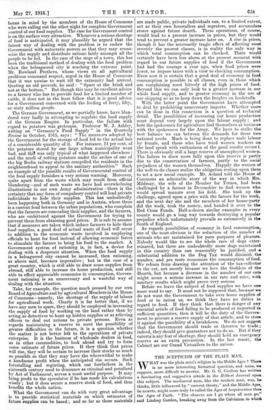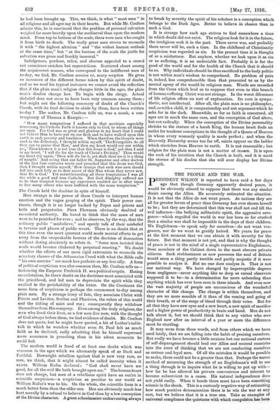THE SCEPTICISM OF THE PLAIN MAN.
WHAT was the plain man's religion in the Middle Ages ? There is no more interesting historical question, and none, we suppore, more difficult to answer. Mr. G. G. Coulton has written a fascinating and suggestive article in the Ilibbert Journal upon this subject. The mediaeval man, like the modern man, was, he thinks, little influenced by." current theory," and the Middle Agee, he asserts, might more truly be called the Ages of Acquiescence than the Ages of Faith. " The chances are I go where all men go," said Lindsay Gordon, breaking away from the Calvinism in which
he had been brought up. This, we think, is what " most men" in all religions and all ages say in their hearts. But while Mr. Coulton admits this, he is convinced that the problem of personal salvation weighed far more heavily upon the mediaeval than upon the modern mind. From top to bottom of the scale, there were men who sought it from birth to death. The really great men strove to reconcile it with " the highest altruism " and " the widest human outlook at the same time," but " at the bottom of the scale the jostle for salvation was gross and frankly immoral."
Indulgences, pardons, relics, and charms appealed to a crowd not conscience-stricken but superstitious. Scattered about among the acquiescent masses, who correspond to the indifferent men of to-day, we find, Mr. Coulton assures us, many sceptics He gives us instances of the different forms taken by this spirit of doubt, and as we read his typical instances we cannot avoid the reflection that if the plain man's religion changes little in the ages, the plain man's doubts change less. To begin with the clergy. Actual disbelief does not seem to have been very common among them ; but might not the following summary of doubt of the Church's Creeds, with its final decision to abide by them, have been written to-day ? The author, Mr. Coulton tells us, was a monk, a con- temporary of Thomas a Kempis :—
" How many temptations I suffered in that novitiate especially concerning the Catholic Faith is known only to God, to whom all things are open. For God was so great and glorious in my heart that I could not believe Him to have put on our flesh and to have walked upon this earth in such poverty and loneliness. When therefore the Gospels were read in the Refectory, I thought within myself,' The Evangelists do all they can to praise that Man,' and then my heart would cry out within me, Thou knowest it is not true that this Jesus is God,' yet then I said in my heart, I will die for the truth of Christ's Divinity.' Then would my heart cry again, Thou wilt die for it, yet shalt thou see it is a thing of naught.' And seeing that our father St. Augustine and other doctors of the first four centuries wrote and preached that this Jesus was God, then I thought within myself, How strange that such wise men should fall into such folly as to dare assert of this Man whom they never saw, that Ho is God.' Yet notwithstanding all these temptations I was all the while a good and true Catholic. But God Almighty suffered me to be thus tempted because my experience enabled me in after times to free many others who were buffeted with the same temptation."
The Creeds held the doubter in spite of himself.
How strange is the power of these Creeds to interpret human emotion and the vague groping of the spirit. Their power con- tinues, though it is no longer backed by Popes and priests and hells and purgatories. Piers Plowman obviously doubted of sacerdotal authority. He hated to think that the mass of men were to be punished for ever ; and he observes, by the way, that the ordinary public " misbelieve," and openly talk of their misbelief in taverns and places of public resort. There is no doubt that at this time even the most ignorant world made mental efforts to get
away from the unspeakable horrors of the doctrine of damnation without daring absolutely to refute it. " Some men insisted that souls would become clinkered by perpetual roasting." We doubt whether the efforts of our more rigid extremists to reconcile the minatory clauses of the Athanasian Creed with what the Bible calls " his own mercies " are much less pathetic or any less silly. A form of political scepticism was also common then, Mr. Coulton tells us— instancing the Emperor Frederick II. as a political sceptic. Hating sacerdotalism, he threw doubt on the doctrines most associated with the priesthood, and led men to depreciate the spirit while they exulted in the perishability of the letter. On the Continent the same form of scepticism is perhaps the commonest to-day among plain men. By a strange irony of fate, they associate Christ with Priests and Levites, Scribes and Pharisees, the rulers of this world and the tithing of mint and rue ; consequently they withdraw themselves from His company. Even among the truly religious, the men who lived their lives, as a few men live now, with the thought of God always before them, we find evidence of doubt. Mr. Coulton does not quote, but he might have quoted, a bit of Luther's table- talk in which he wonders whether even St. Paul felt as much faith as he declared, sadly admitting that he himself expressed more assurance in preaching than in his silent moments he could feel.
The modern world is freed of at least one doubt which was common in the ages which we alternately speak of as Dark and Faithful. Downright rebellion against God is now very rare, so rare, we think, that it might almost be called insanity when it exists. William Rufus declared : " God shall never have me good, for all the evil He hath brought upon me." The human heart does not change, but men of a rebellious spirit have an outlet in scientific scepticism—a scepticism as peculiar to our world as William Rufus's was to his. On the whole, the scientific form is a much better form than the older one. Men are obviously much less hurt morally by a refusal to believe in God than by a low conception of the Divine character. A great schoolmaster endeavouring always to break by severity the spirit of his scholars is a conception which belongs to the Dark Ages. Better to believe in chance than in such a God.
It is strange how each age strives to find somewhere a time in which doubt did not exist. The religious look for it in the future, the irreligious seek it in the past. There never was, and probably there never will be, such a time. In the childhood of Christianity scepticism was regarded as sin. In the present time it is thought of as a misfortune. But anyhow, whether we look upon it as sin or as suffering, it is an undeniable fact. Probably it is for the good of the world and for the health of the Church that it should be so. Why individuals should be thus sacrificed to the body politic is not within man's wisdom to comprehend. No problem of pain is, indeed, less comprehensible than that presented to us by the mental agony of the would-be religious man. Words are recorded from the Cross which lead us to suppose that even to this branch of human suffering Christ was not strange. In the worst dilemmas of life religion offers no sort of explanation. Its cure is sympa- thetic, not intellectual. After all, the plain man is no philosopher, and, as with a child, it is companionship and not argument which he asks for in the dark. Meanwhile, so far as faith is concerned, all ages are in much the same case, and the conception of God alters, but not radically. When the conception of the Divine personality shrinks to the stature of a harsh King, the human heart finds an outlet for tenderer conceptions in the thought of a Queen of Heaven in whom every womanly quality is made perfect ; and when the Heavenly Hierarchy seems too far off, saints appear on the ladder which stretches from Heaven to earth. It is not reasonable ; but religion for the plain man is not a matter of reason. It is upon the rock of his intuition that the Church is built, and it is amid the storms of his doubts that she will ever display her Divine strength.































 Previous page
Previous page